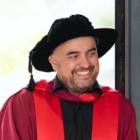
This story is part three in a series. For the full series go here.
When Scott Morrison led the Coalition to victory in the “I believe in miracles” election on May 18, 2019, it became clear he was here to stay. Yet little was known about the man many assumed was little more than a nightwatchman prime minister.
But one thing was known: he had been open about his Pentecostalism — an enigmatic form of Christianity which is poorly understood in Australia.
I can claim personal familiarity. Apart from conducting ethnographic research in Pentecostal-charismatic churches, I grew up attending one. So what’s it like inside?
Pentecostal-charismatic spirituality is dominated by the “worship service”, a space for spiritual “encounters” with God. Catalysing these encounters, typically, is an extensive music ministry, which tends to be one of the most important elements in a service. There are photos of Morrison in the Horizon church in Sydney’s Sutherland shire with his hands raised and his eyes closed. This is typical of a Pentecostal-charismatic believer singing along to the music produced by the worship band and experiencing the encounter — akin to an ecstatic trance.
There are some elements of what I call Pentecostal-charismatic Christianity that are, I would argue, useful for understanding the shape of Morrison’s leadership. Of particular interest and concern is Pentecostal-charismatic Christianity’s seeming lack of resistance to an even newer phenomenon to which Morrison is even more devoted — neoliberalism. But to get there, I have to back up a little.
Origin stories
Pentecostalism is not one thing. It never was. It has at least three discrete origin stories, the most popular being that of the Azusa Street Revival of 1906 in Los Angeles — a movement known for its racial integration and equality, as well as divine healing and speaking in tongues as a direct experience of the Holy Spirit.
There is a historic link to Methodism. Methodists traditionally emphasised the importance of emotion in faith, and put a premium on “sanctification”, or becoming increasingly holy. Faith was supposed to change emotions and character, aligning them morally to God’s will.
Methodism’s focus on emotional experience of faith, moral transformation and suspicion of theological study, combined with the Holiness Movement’s belief in a “second blessing” (predicated on the idea that the Holy Spirit completes a secondary work of “entire sanctification”) form the philosophical and theological antecedents of Pentecostalism.
The early Pentecostal movement was characterised by a “pre-millennial” theology, which that Jesus would imminently return and commence a 1000-year reign upon the earth. This emphasis on the return of Jesus led early Pentecostals to engage feverishly in mission, one factor that helps explain the movement’s explosive growth.
“Charismatic Christians” — or Christians from mainline churches who experienced Pentecostal phenomena via the charismatic movement beginning in the 1960s — tended not to have this pre-millennial view, and thus it was also no longer central, although it continues to be an element in the faith of many Pentecostal-charismatic Christians.
Pentecostal-charismatic Christians tend to take a highly literal view of the Bible, which is not surprising given that the movement was (and usually still is) perceived as a restoration of the experience of the church in the New Testament, including reports of healings, speaking in tongues, prophecy and exorcism.
Pentecostal-charismatic Christians take a highly pragmatic approach to life and faith, believing that a “commonsense” interpretation of the Bible and doctrine is probably correct, and the most important thing is to get busy doing God’s work. While they typically place high value on individual morality, this pragmatism means they have historically tended to be less concerned about structural issues such as inequality, racism and sexism.
Such things are more likely to be viewed as individual problems, rather than something that can be addressed politically. Their commonsense literal view of the Bible also means that Pentecostal-charismatic Christians tend to a moral conservatism which may seem at odds with their exuberant spirituality.
For instance, most Pentecostal-charismatic churches would take a conservative position on LGBTQ+ sexuality, believing that acting upon sexual desire for those of the same gender is proscribed by the Bible. In the past, Pentecostal-charismatic Christians have been enthusiastic advocates for various forms of conversion therapy or sexual orientation change efforts — particularly forms of this that rely upon prayer for miraculous healing.
Neoliberalism and responsibilisation
It is unclear how much Morrison’s Pentecostal-charismatic faith influences his governance or approach to policy, particularly when we consider how disparate and diverse that faith has been historically and remains. Arguably his allegiance to neoliberalism, which at times had formed an odd amalgam with his faith, helps explain him better.
In the past, I have argued that Pentecostal-charismatic Christianity may be particularly vulnerable to some aspects of neoliberal totalisation. The ubiquity of entrepreneurship, increasingly perceived as an innocent metaphor for “innovative” approaches to solving problems — “an entrepreneurial approach” and even “social entrepreneurship” have entered everyday parlance — is particularly attractive to Pentecostal-charismatic churches and their leaders.
Typically megachurches are led by powerful entrepreneurial figures — the “pastorpreneur”, a portmanteau coined (apparently unironically) by American church growth consultant John Jackson.
The pastorpreneur is someone prepared to take great personal financial risk — leaving a secure job and salary — to meet a need or desire, in this case “to work with people who had given up on the traditional church but had not given up on God”.
Neoliberalism is bred in Morrison’s bones, and the unholy alliance of his faith and neoliberal ideology was on display in his address to the Australian Christian Churches National Conference in April. Morrison recalled that, in the week before the election, he had been praying while looking at a photograph of an eagle, and received — in Pentecostal-charismatic fashion — a direct communication from God: “Scott, you’ve got to run to not grow weary. You’ve got to walk to not grow faint. You’ve got to spread your wings like an eagle to soar like an eagle.”
These fragmented biblical references also display Morrison’s adherence to the neoliberal doctrine of responsibilisation: if you want something, you must achieve it, no one (apparently not even God) is going to support you. Similarly, responsibilisation was also evident in Morrison’s maiden speech in Parliament when he reconfigured fairness: “I think that’s what fairness means in this country. It’s not about everybody getting the same thing. If you put in, you get to take out. And you get to keep more.”
Will COVID-19 finally bring his soaring flight crashing down, or will the coming election be an even more spectacular miracle? I don’t pretend to know.
Tomorrow: Morrison’s political deeds and actions through a godly lens








There is nothing in the slightest Xtian about Morrison.
He is a grubby opportunist who nobody in their right mind would employ to run a corner car wash.
Only if they wanted to be embezzled out of the business.
Okay, I’ll tackle this one: speaking in tongues was never meant for the congregation all at the same time, as these usurper cults are doing. One person was gifted with a message in a language unknown to them – but only if someone of that language group was present to translate the message. Another time it could be another person speaking in another language, again only if someone present spoke that “tongue” and could translate. It was never intended to be a whole group babbling because how could anyone work out which tongue any of it was in and therefore translate God’s message? I doubt there was any music either.
It has all become a money-making con and only the cult leader gets rich, unless there are investors getting a cut, which proves itnis a business and should be paying tax.
The other point about these groups is: they believe it’s okay to lie, steal and cheat anyone not belonging to their faith. I know tjis as fact, it was done to me by a family member who joined them. So, of course, the gullible and greedy–mostly the greedy– will join, especially when told they are saved because paster so-and-so baptised them, and then they are too scared to un-believe in case they find out it really was all a sham.
Morrison will pretend to be anything that feeds his ego and an ambition that is way above his capabilities
It’s hard to shed so useful a tool to deal with a total tool but you are to be commended for that neat precis of Acts 2.
Shame, it was a good for a laugh.
Spot on- organised religion is a massive con; its all about making people feel better about themselves and with Pentecostalism, feeling better than everyone else! Morrison is the ‘çonman in chief’ and his absolute self belief makes him seem plausible, even convincing at times. As a result of this self belief, he does not see that he lies and therefore has no shame. He conned many Australian voters last time, can he do it again?????
Why the heck wouldn’t god speak the Queen’s English?
I think the ‘mockers’ had it –
“Now there were dwelling in Jerusalem God-fearing Jews from every nation under heaven. And when this sound rang out, a crowd came together in bewilderment, because each one heard them speaking his own language. Astounded and amazed, they asked, “Are not all these men who are speaking Galileans? How is it then that each of us hears them in his own native language? 9Parthians, Medes, and Elamites; residents of Mesopotamia, Judea and Cappadocia, Pontus and Asia, Phrygia and Pamphylia, Egypt and the parts of Libya near Cyrene; visitors from Rome, both Jews and converts to Judaism; Cretans and Arabs—we hear them declaring the wonders of God in our own tongues!”
Astounded and perplexed, they asked one another, “What does this mean?”
But others mocked them and said, “They are drunk on new wine!”
Ah, so it was all the booze?
It usually is, when stupid behaviour and mass delusion takes place.
Have we ever had a less charismatic, (or even “Charismatic”) leader than Morrison?
Personally, I can’t reconcile a “literal” interpretation of the Bible with a “commonsense” one. Pentecostals don’t think context and cultural mores make a difference to “commonsense”? Certainly, “you have to run to not grow weary” seems nonsensical to me.
Yes, these two paragraphs cannot be reconciled.
If you read the origin story of neoliberalism – the excellent Jessica Whyte – it aligns with conservative religiosity.
Up till now, Morrison’s post-COVID policy for record mass migration has gone unchallenged – because that would be “racist”. Now that Opus Deu madman Perrotet has nearly doubled Morrison’s extreme, will the “left” push back? Nope.
It is heavily derived from the US. American socio-linguist, George Lakoff writes about it in his books, ‘Moral Politics’ and ‘Don’t think of an elephant’.